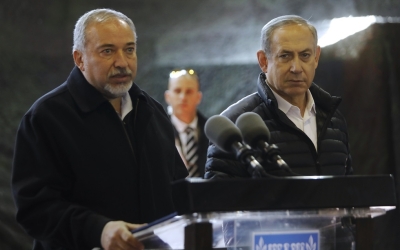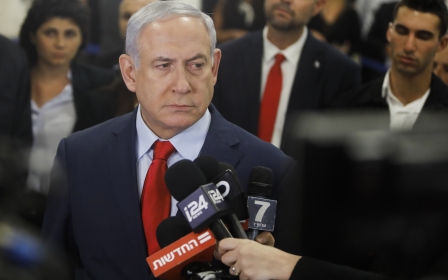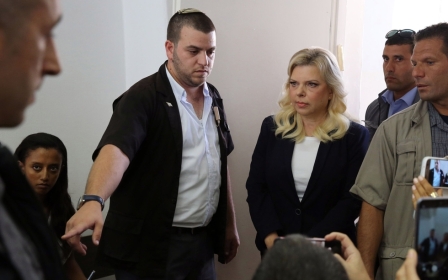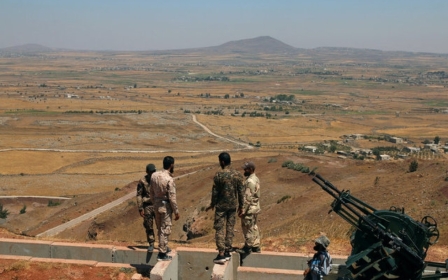Israeli electoral alliances begin reforming as Lieberman slams Netanyahu
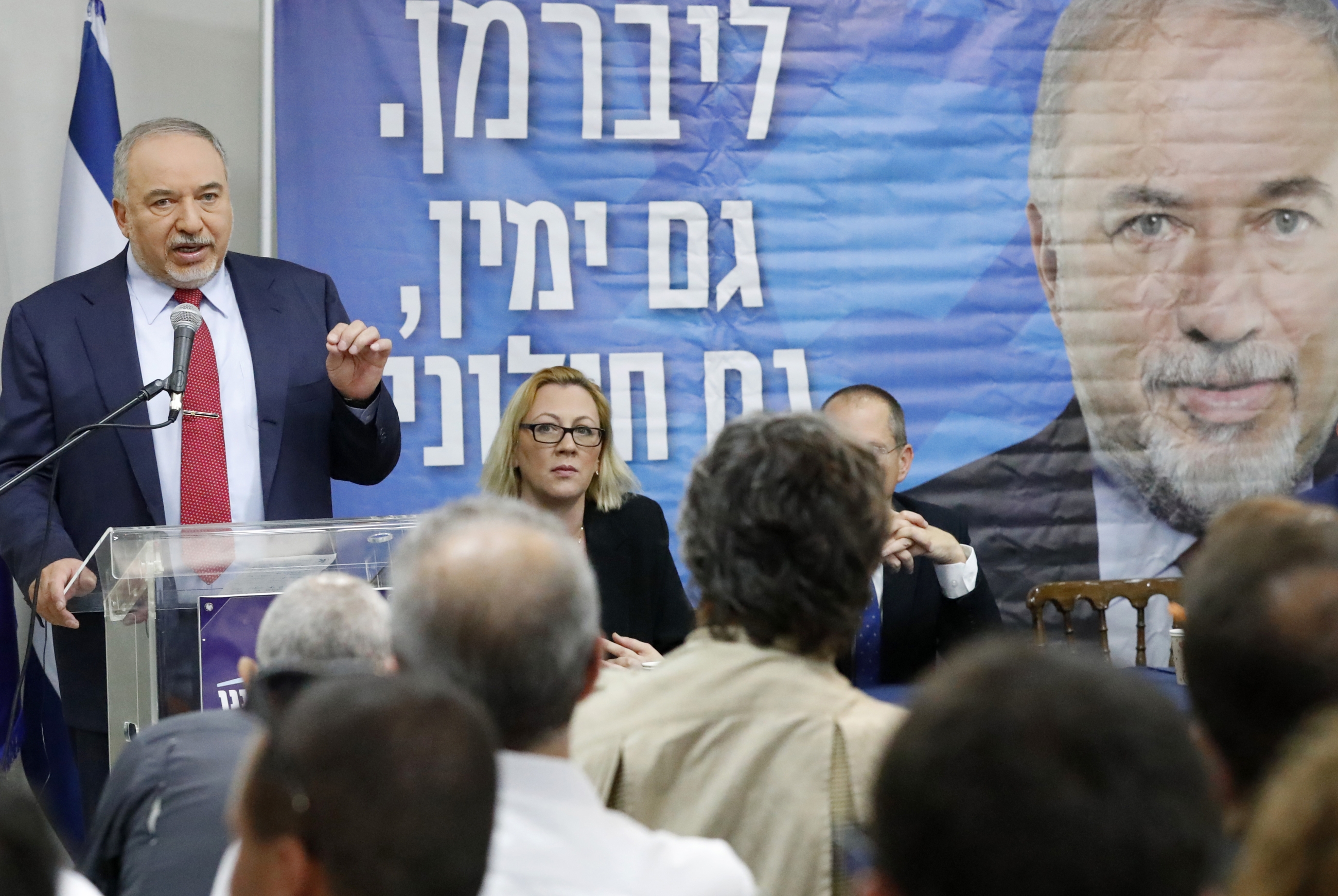
Israeli politicians have begun mobilising in response to the announcement of new elections, following the collapse of talks to form a new government on Wednesday.
With talks failing between Prime Minister Benjamin Netanyahu and potential coalition partners, Israelis are set to return to the polls on 17 September.
Netanyahu failed to win the support of ultranationalist Yisrael Beitenu party leader Avigdor Lieberman, who clashed with the Likud prime minister over a bill to force ultra-Orthodox yeshiva students to serve in the military.
Another potential coalition partner, United Torah Judaism - which represents much of Israel's ultra-Orthodox population - had demanded the amendment of the bill as a pre-condition for joining the government. Lieberman's secular Yisrael Beitenu had warned they would not join if this happened.
Israel’s political crisis: A timeline
+ Show - Hide14 November 2018
Defence Minister Avigdor Lieberman withdraws from Israel’s governing coalition in protest against ceasefire talks with Hamas, leaving Benjamin Netanyahu’s government with only a slight majority in parliament.
19 November 2018
After emergency talks, Netanyahu avoids a snap election when far-right Education Minister Naftali Bennett drops his threat to collapse the coalition if he is not made defence minister.
2 December 2018
Israeli police recommend corruption charges against Netanyahu for allegedly offering telecoms company Bezeg better contracts in exchange for positive coverage in a news website under the same owner.
24 December 2018
After resisting pressure and following weeks of infighting in his cabinet, especially over a military exemption bill affecting ultra-Orthodox Jews, Netanyahu calls a snap election for April 2019.
21 February 2019
Netanyahu’s strongest opponents, including three former military chiefs, launch the Blue and White political alliance aimed at ending the prime minister’s decade in power. The two strongest candidates, Benny Gantz and Yair Lapid, agree to rotate the role of premier if they win.
9 April 2019
Netanyahu wins a record fifth term as prime minister. Though Blue and White equalled the number of seats as his Likud party, the number of seats won by Netanyahu’s right-wing allies put him in the strongest position to form a government.
25 May 2019
Thousands of Israelis from all political parties protest against Netanyahu and suggestions his party will fight to grant him immunity against corruption charges
27 May 2019
Netanyahu vows to build a coalition despite his failure to secure an agreement more than a month after the election and with only 48 hours until the deadline to form a government passes. Lieberman refuses Netanyahu’s request to join the coalition.
29 May 2019
Netanyahu misses his deadline to form a coalition and the Israeli parliament votes for new elections on 17 September 2019.
On Thursday, following the passage of a bill to dissolve the Knesset, Lieberman lashed out at Netanyahu, accusing him of seeking to form a "religious government".
"The public is tired of the capitulating to the ultra-Orthodox. It has understood this was a sellout to the ultra-Orthodox," he said at a news conference.
Netanyahu's former aide ruled out supporting the prime minister in the upcoming election, as well as his main challenger Benny Gantz of the Blue and White coalition.
"I think that Benny Gantz is an excellent person, but he is really not our candidate for forming the government - neither now nor in the future," he said.
"We will support a sane national government, not a religious government."
For his part, Netanyahu denounced Lieberman as having sided with "the left-wing" in bringing down a right-wing government.
"Don’t believe him again. I will tell you about it tomorrow. Maybe I will tell you some things you don’t know. He deceived the electorate just to get votes," he said, visibly angry, to the media in the early hours of Thursday.
Some pundits have already begun proclaiming the new elections potentially the "beginning of the end" for Netanyahu, who is just under a month away from becoming Israel's longest-serving prime minister.
The new elections are set to be held just two weeks before Netanyahu's pre-indictment hearing on a series of corruption charges.
The announcement of new elections also comes as US President Donald Trump's son-in-law and aide Jared Kushner was in Jerusalem as part of a Middle East trip pushing a long-mooted plan for Israel-Palestine peace.
Jared Kushner was expected to meet Israeli Prime Minister Benjamin Netanyahu on Thursday, as he arrived following earlier stops in Morocco and Jordan.
No details have so far been released of his schedule.
Kushner - who is accompanied by Trump envoy Jason Greenblatt and US special representative for Iran Brian Hook - has been a key architect of the "deal of the century", which was originally set to be unveiled after the Israeli elections.
However, the new elections could potentially see the announcement delayed.
New alliances
Although most of the political coalitions that ran in the previous elections on 9 April are expected to remain largely unchanged, some politicians announced they were exploring potential new alliances.
Ayman Odeh, leader of the left-wing, pro-Palestinian Hadash party, said that there had been talks about reforming the Joint List which had run in the 2015 elections.
The pro-Palestinian Joint List was the third-largest group in the parliament following the 2015 elections, but in February the group split into two electoral alliances, with Hadash and Ahmed Tibi's Taal party in one group and Balad and the United Arab List on the other.
Speaking to Army Radio on Thursday, Odeh said the parties were back in discussions to reunite.
“We have drawn together as much as possible,” he said. “We hope that within a week we will decide how to run.”
Odeh had lightened proceedings on Wednesday evening by mocking Netanyahu's desperation for coalition partners.
"Seven minutes ago Prime Minister Benjamin Netanyahu spoke to me and he said he is willing to withdraw from the occupied territories and also to cancel the nation-state law, and that he supports not only civil equality but also national equality, and that he's willing to recognize the Nakba and fix the historical wrong – in return for the immunity law," he said, to the sound of laughter, listing numerous Palestinian political goals that Netanyahu was fundamentally opposed to.
"And I had no time to consult with you! And I'm looking at the clock and wondering when I have to get back to him."
Another far-right politician, Moshe Feiglin - who failed to enter the Knesset after a campaign based largely on a combination of ultra-nationalism, libertarian economics and legalising cannabis - also hinted that he was open to joining an alliance with the far-right New Right party, led by Education Minister Naftali Bennett, which also failed to win seats.
Asked by the Times of Israel about a possible merger, he simply said he would not “talk now about things that are happening behind the scenes”.
Meretz Chairwoman Tamar Zandberg said her centre-left party should unite with the Labor Party to strengthen the "left-wing bloc", but she was also scathing of the party's chairman Avi Gabbay after he admitted on Wednesday that he considered Netanyahu's offer to join the coalition government.
"The ones who said they wouldn't sit with Netanyahu under any circumstance actually entertained the idea," she said on Facebook.
Middle East Eye propose une couverture et une analyse indépendantes et incomparables du Moyen-Orient, de l’Afrique du Nord et d’autres régions du monde. Pour en savoir plus sur la reprise de ce contenu et les frais qui s’appliquent, veuillez remplir ce formulaire [en anglais]. Pour en savoir plus sur MEE, cliquez ici [en anglais].



